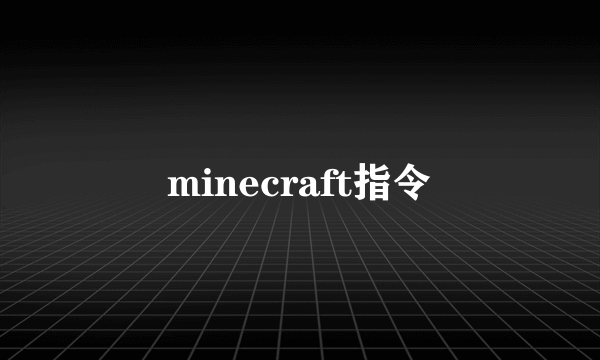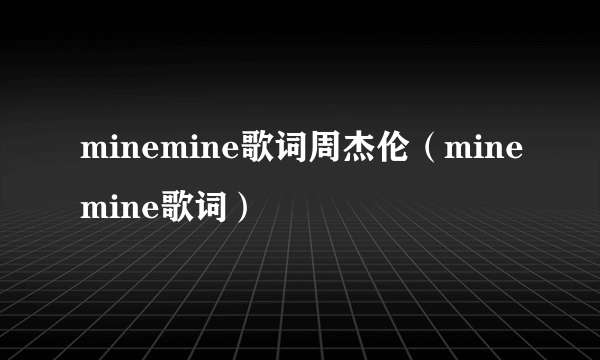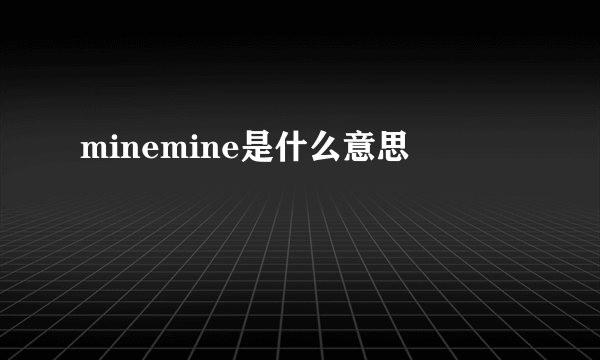
大家好,知识小编来为大家讲解下。mine是什么意思,mine的用法很多人还不知道,现在让我们一起来看看吧!
一、mine是什么意思
1、mine 我的
2、来自me的所有格。
3、mine 矿,矿山,地雷
4、来自古法语mine,矿脉,矿石,矿山,来自古凯尔特语*menis,矿石,金属,来自PIE*smi,砍,削,挖,词源同smith,blacksmith,silversmith.后引申词义炸矿的炮弹,地雷。
5、mine 我的
6、来自me的所有格。
7、mine 矿,矿山,地雷
8、来自古法语mine,矿脉,矿石,矿山,来自古凯尔特语*menis,矿石,金属,来自PIE*smi,砍,削,挖,词源同smith,blacksmith,silversmith.后引申词义炸矿的炮弹,地雷。
二、mine的用法
1、mine
2、mine: English has two quite distinct words mine. The first person possessive pronoun [OE] goes back to a prehistoric Germanic *mīnaz (source also of German mein, Dutch mijn, and Swedish and Danish min), which was derived from the same Indo-European source as produced English me. Originally it was an adjective, but in the 13th century the -n was dropped before consonants, and eventually the resulting my took over the adjective slot altogether, leaving mine as a pronoun only. Mine ‘excavation’ is of uncertain origin.It comes via Old French from an assumed Vulgar Latin *mina, which may go back ultimately to a Celtic *meini- ‘ore’ (Gaelic has mein ‘ore, mine’ and Welsh mwyn ‘ore’). The use of the word for an ‘explosive device’, which dates from the 17th century, arose from the practice of digging tunnels or ‘mines’ beneath enemy positions and then blowing them up.=> me, my
3、mine (pron.)
4、Old English min "mine, my," (pronoun and adjective), from Proto-Germanic *minaz (cognates: Old Frisian, Old Saxon Old High German min, Middle Dutch, Dutch mijn, German mein, Old Norse minn, Gothic meins "my, mine"), from the base of me. Superseded as adjective beginning 13c. by my.
5、mine (n.1)
6、"pit or tunnel in the earth for obtaining metals and minerals," c. 1300, from Old French mine "vein, lode; tunnel, shaft; mineral ore; mine" (for coal, tin, etc,), of uncertain origin, probably from a Celtic source (compare Welsh mwyn, Irish mein "ore, mine"), from Old Celtic *meini-. Italy and Greece were relatively poor in minerals, thus they did not contribute a word for this to English, but there was extensive mining from an early date in Celtic lands (Cornwall, etc.). From c. 1400 as "a tunnel under fortifications to overthrow them."
7、mine (v.2)
8、"lay explosives," 1620s, in reference to old tactic of tunneling under enemy fortifications to blow them up; a specialized sense of mine (v.1) via a sense of "dig under foundations to undermine them" (late 14c.), and miner in this sense is attested from late 13c. Related: Mined; mining.
9、mine (v.1)
10、to dig, c. 1300, "to tunnel under fortifications to overthrow them," from mine (n.1) or from Old French miner "to dig, mine; exterminate." From mid-14c. as "to dig in the earth" (for treasure, etc.). Figurative use from mid-14c. Related: Mined; mining.
11、mine (n.2)
12、explosive device, by 1850, from mine (v.2).
本文到此分享完毕,希望对大家有所帮助。



